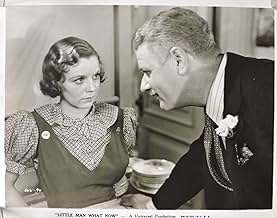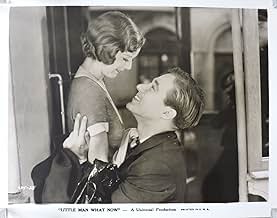Füge eine Handlung in deiner Sprache hinzuA young couple struggling against poverty must keep their marriage a secret in order for the husband to keep his job, as his boss doesn't like to hire married men.A young couple struggling against poverty must keep their marriage a secret in order for the husband to keep his job, as his boss doesn't like to hire married men.A young couple struggling against poverty must keep their marriage a secret in order for the husband to keep his job, as his boss doesn't like to hire married men.
- Regie
- Drehbuch
- Hauptbesetzung
- Auszeichnungen
- 4 wins total
Empfohlene Bewertungen
This is a sadly unknown and obscure film classic from the 1930s and one of my own favorites of all Frank Borzage's love stories.
A very sad and heartbreaking tale of a German couple surviving in a Nazi-occupied town in 1920s Germany, "Little Man, What Now?" was the first Borzage film to attack Hitler and the horrors of Nazism, prefiguring the director's later anti-Nazi masterpieces like "Three Comrades"(1938), "The Mortal Storm"(1940) and "Till We Meet Again"(1944).
"Little Man" is a painfully realistic and terrifying experience, especially the second half; and yet strangely full of hope and affirmation. Margaret Sullavan is as always luminous and touching in her portrayal of Lammchen Pinneberg. It is interesting to compare "Little Man" with Sullavan's other Borzage films like "Three Comrades" and "The Mortal Storm." There's something about her sweet innocence, devotion, and luminosity that works well with Borzage's soft-focus, anti-Nazi attitude. The glittering white dress she wears half-way throughout the film seems to suggest a symbol of light and hope (however transient) for Montgomery and against the brutal 1920s depression milieu, the same way Loretta Young's heartbreaking devotion and sweetness are intended to rescue Spencer Tracy's tough, smart-alecky personality in Borzage's 1933 masterwork "Man's Castle."
As with "Man's Castle", the Depression and, particularly in this case, Nazism are less physical than a spiritual or emotional threats to Borzage's lovers. Despite the bleak, depressing reality the characters have to surpass, both "Little Man" and "Man's Castle" retain Borzage's tender touch and humanity, inviting audience forgiveness for his characters' fragility and vulnerability.
This film will break your heart and should never be missed.
A very sad and heartbreaking tale of a German couple surviving in a Nazi-occupied town in 1920s Germany, "Little Man, What Now?" was the first Borzage film to attack Hitler and the horrors of Nazism, prefiguring the director's later anti-Nazi masterpieces like "Three Comrades"(1938), "The Mortal Storm"(1940) and "Till We Meet Again"(1944).
"Little Man" is a painfully realistic and terrifying experience, especially the second half; and yet strangely full of hope and affirmation. Margaret Sullavan is as always luminous and touching in her portrayal of Lammchen Pinneberg. It is interesting to compare "Little Man" with Sullavan's other Borzage films like "Three Comrades" and "The Mortal Storm." There's something about her sweet innocence, devotion, and luminosity that works well with Borzage's soft-focus, anti-Nazi attitude. The glittering white dress she wears half-way throughout the film seems to suggest a symbol of light and hope (however transient) for Montgomery and against the brutal 1920s depression milieu, the same way Loretta Young's heartbreaking devotion and sweetness are intended to rescue Spencer Tracy's tough, smart-alecky personality in Borzage's 1933 masterwork "Man's Castle."
As with "Man's Castle", the Depression and, particularly in this case, Nazism are less physical than a spiritual or emotional threats to Borzage's lovers. Despite the bleak, depressing reality the characters have to surpass, both "Little Man" and "Man's Castle" retain Borzage's tender touch and humanity, inviting audience forgiveness for his characters' fragility and vulnerability.
This film will break your heart and should never be missed.
Legendary American born director Frank Borzage was a master at romance set in difficult situations. He specialised in stories set in Germany just before or during the build-up to WW11 (The Mortal Storm '40 - Three Comrades '38) In this interesting pre-code drama he's following two young lovers in 1930s Germany - as they hide the fact they are newly married and expecting a child. The young man (Douglas Montgomery) is keeping his secret to protect his current job - that for various reasons demands he's single.
The settings (outdoor and indoor) are a delight to the eye, even when they are living in a stable! This is life as raw as it can be for two young newlyweds living in the glow of their own love - within a rapidly changing pre war German landscape. Prolific veteran cinematographer Norbert Brodin (known for several classic Noir dramas including "The Kiss of Death" '47) who, with a combination of fine art and set direction; create a dreamlike poetic look for this thoughtful and offbeat film that deserves to be better known.
Highly recommended for lovers of vintage dramas that highlight a historical time gone by, and do so with a special flair. Also, for the truly remarkable, unforgettable Margaret Sullavan.
The settings (outdoor and indoor) are a delight to the eye, even when they are living in a stable! This is life as raw as it can be for two young newlyweds living in the glow of their own love - within a rapidly changing pre war German landscape. Prolific veteran cinematographer Norbert Brodin (known for several classic Noir dramas including "The Kiss of Death" '47) who, with a combination of fine art and set direction; create a dreamlike poetic look for this thoughtful and offbeat film that deserves to be better known.
Highly recommended for lovers of vintage dramas that highlight a historical time gone by, and do so with a special flair. Also, for the truly remarkable, unforgettable Margaret Sullavan.
Full of Borgaze's trademark swoony romanticism mixed with a touch of pre-code decadence. This tale of a struggling young couple also boasts Margaret Sullavan's enchanting sensitive performance, she seems to carry a gossamer glow with her where ever she goes. Alan Hale also adds much to the film as a sprightly good-hearted charlatan but what drags it down almost fatally is Douglass Montgomery in the male lead. To put it plainly, he stinks. He's a stiff blank slate that stops the film dead in its tracks whenever he's the focal point of the scene. You're left to wonder what a more effective actor such as Jimmy Stewart or Cary Grant could have made of the part and how much better the movie would have been because of their casting.
This movie represents the best of the early '30s soap opera genre. Based on an earthy German novel, it satisfies from the opening credits to the end. Margaret Sullavan was never more eager, poignant or believable and I think it must be the role that made her a star. Douglass Montgomery showed a promise he was never again given a chance to develop or display in Hollywood. The supporting cast included Alan Hale and Mae Marsh, two of the best actors in the business at the time. In my opinion, MGM got a great return on its investment. This movie managed to stay within the bounds of the excessive censorship in effect at the time (although some of the plot does come up to the line) and although it showed how desperate times call for desperate measures, it never lost its message of faith and hope. I hope it's available on DVD soon.
I see that the German cinema did a version of Little Man What Now a year before this Universal Picture came out. Depending on exactly when Dr. Goebbels took over their movie industry the message would have been far more polemic than here. I could see this as good material for either a Nazi inspired film or a left wing one.
But Frank Borzage as director always seems to concern himself with the plight of young lovers, the truly innocent of the world and how forces around them are buffeting their chances at happiness. Which seems to be a capital sin in Borzage films.
A lot similarity between this one and later Borzage works like Three Comrades and The Mortal Storm which also starred Margaret Sullavan. In Little Man What Now Douglass Montgomery and Margaret Sullavan are a pair of young marrieds who just can't seem to get traction enough for Montgomery to earn a living and support Sullavan and the baby coming. As things go from bad to worse Montgomery is tempted to seek radical politics of some kind.
My favorite scene in the film concerns poor Montgomery waiting on a self centered cinema star in the department store where he is currently employed. Alan Mowbray is unforgettable in that one scene. Interesting showing a the indulgences of a selfish man can have such an effect as Montgomery's job is on the line.
Even now too many of us live two paychecks from the gutter and too many of us are tempted by demagogues as a result. In that way Little Man What Now is still a very relevant film.
But Frank Borzage as director always seems to concern himself with the plight of young lovers, the truly innocent of the world and how forces around them are buffeting their chances at happiness. Which seems to be a capital sin in Borzage films.
A lot similarity between this one and later Borzage works like Three Comrades and The Mortal Storm which also starred Margaret Sullavan. In Little Man What Now Douglass Montgomery and Margaret Sullavan are a pair of young marrieds who just can't seem to get traction enough for Montgomery to earn a living and support Sullavan and the baby coming. As things go from bad to worse Montgomery is tempted to seek radical politics of some kind.
My favorite scene in the film concerns poor Montgomery waiting on a self centered cinema star in the department store where he is currently employed. Alan Mowbray is unforgettable in that one scene. Interesting showing a the indulgences of a selfish man can have such an effect as Montgomery's job is on the line.
Even now too many of us live two paychecks from the gutter and too many of us are tempted by demagogues as a result. In that way Little Man What Now is still a very relevant film.
Wusstest du schon
- WissenswertesBased on the 1932 novel of the same name by Hans Fallada
- VerbindungenReferenced in Wake Up and Dream (1934)
Top-Auswahl
Melde dich zum Bewerten an und greife auf die Watchlist für personalisierte Empfehlungen zu.
Details
- Laufzeit
- 1 Std. 38 Min.(98 min)
- Farbe
- Seitenverhältnis
- 1.37 : 1
Zu dieser Seite beitragen
Bearbeitung vorschlagen oder fehlenden Inhalt hinzufügen

























